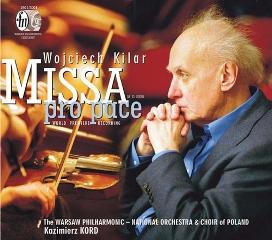Wojciech Kilar – Missa Pro Pace (2001)
Wojciech Kilar – Missa Pro Pace (2001)

1. Kyrie 13:01 2. Gloria 07:00 3. Credo 17:21 play 4. Sanctus 05:23 5. Benedictus 02:42 6. Agnus Dei 12:18 7. Dona nobis pacem 06:42 Izabella Klosinska - soprano Jadwiga Rappe - mezzo-soprano Charles Daniels - tenor Romuald Tesarowicz – bass Warsaw Philharmonic Choir Warsaw Philharmonic Orchestra Kazimierz Kord - conductor
Kilar has not always been the beaming face of contemporary Polish music. In the mid-1970s his works bore the sterner impress of Penderecki. The choral and orchestral work Bogurodzica is an example of something closer to the forbidding face of dissonance and fragmentation. In the Mass recorded here Kilar has profundity in his sights but his language, shaped by the universality of his subject matter, is tonal and communicates without barrier.
Spirituality has always been there. Kilar's Missa Pro Pace is ambitious in scale and message. Like the recently heard Vasks String Quartet No. 4 the music seems to look back over the twentieth century knowing its slaughters, pogroms and obdurate heartlessness. Rather than despairing the Mass finally sings a reconciling song - sorrowful yet triumphantly calm.
The Missa is in five meaty sections each allocated its own substantial track. There is no further sub-division although some of the sections are clearly in further episodes.
The scene is set by a stern-tense adagio where the radiant opulence of Barber-like strings meets the seething tension of a Shostakovich adagio-meditation. There is an unaccompanied Kyrie eleison where the soloists enter in a meditative duet. The following Gloria in excelsis deo (tr.2) tests the massed choirs with pummelling motorism as the singers spit out the words. The echo is inevitable: Orff. The solo voices return in an idyllic intertwining duet like that in Delius's Once I passed through a populous city. Martellato writing for the choir closes the Gloria.
The centre-point comes in the third track where the undulating movement of Russian Orthodox spirituality is heavy with the fragrance of incense. The choir produce a consistently joyous velvet and auburn glow in the singing of the Crucifixus (tr 3 10.02).
Kilar takes the Brucknerian way of the sincere head-bowed composer, the servant of his message. ---Rob Barnett, www.musicweb-international.com
Missa pro pace jest pierwszym ściśle liturgicznym dziełem kompozytora. Powstała w 2000 roku na zamówienie Kazimierza Korda z okazji jubileuszu stulecia Filharmonii Narodowej. Jest to tradycyjny cykl złożony z części stałych, z wyodrębnioną Dona nobis pacem. Kompozytor nawiązuje w niej do idiomów muzycznych wczesnego średniowiecza, baroku i romantyzmu. Dzieło przyjęte z wielkim entuzjazmem, Bohdan Pociej opisał słowami: głęboko tradycyjna, w średniowiecznej aż pobożności zakorzeniona - jest w swej ekspresji niezwykła. Uderza jej moc wewnętrzna, duchowa, tłumacząca się siłą wiary. Tę moc muzyki prostą i skupioną odczuje każdy jej słuchacz współuczestniczący w mszalnym misterium. Albowiem Wojciech Kilar napisał muzykę religijną do rdzenia - w całkowitej adekwatności środków, języka i stylu do łacińskiego tekstu Mszy. --- pwm.com.pl
download: uploaded anonfiles yandex 4shared solidfiles mediafire mega filecloudio nornar
Zmieniony (Niedziela, 29 Grudzień 2013 15:05)








